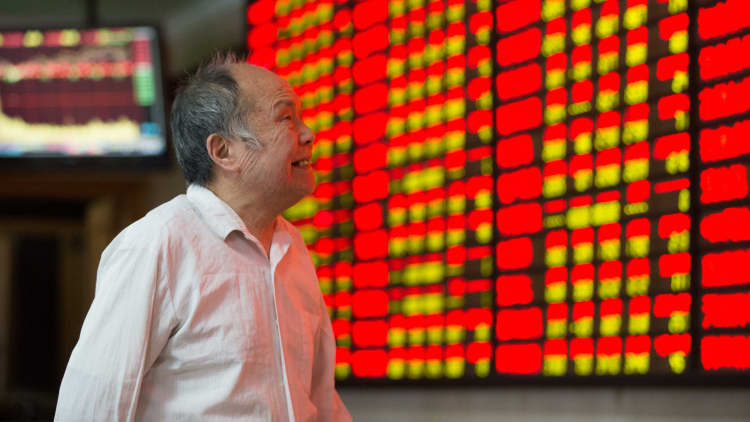
Chinese stocks posted their worst weekly performance since August on Friday, with major indices tumbling in excess of 5 percent after regulators launched an investigation into security brokerage firms in the country.
The sharp declines halted a bull run in Chinese stocks that has seen the Shanghai Composite index rally over 20 percent since its lows in August. The Shanghai Composite closed 199 points, or 5.5 percent, lower on the day.
Chinese brokerages took major hits, with Citic Securities, Founder Securities and China Merchants all closing around 10 percent lower after news broke that the China Securities Regulatory Commission had launched investigations into these firms to weed out short selling and speculation.
The global head of emerging markets cross asset strategy at UBS, Bhanu Baweja, said that the day's price action reflected weak industrial profits, as well as news of the crackdown.
"Look at iron ore prices, look at copper prices: They have been declining almost in a straight line for two months. Emerging markets have taken some time to catch up and I think today's price action, although the immediate catalyst might have been the crackdown from the authorities on margin trading, this has been a little while coming, because industrial profits have been very poor," he told CNBC on Friday.
China's other stock indexes also slumped on Friday, with the Shenzhen Composite closing down 6.1 percent, the ChiNext down 6.1 percent and the CSI 300 Index declining 5.4 percent.
Industrial metal prices have repeatedly hit multiyear lows throughout 2015 on China demand slowdown fears. However, they looked on track for their first weekly gain since October on Friday, after posting sharp gains on Thursday on hopes that China might cut production.
But analysts remain bearish, with Goldman Sachs and UBS both issued warnings on the sector on Friday. Goldman said that recent hints of Chinese government intervention to combat oversupply would at best provide temporary support for metal prices.
"A sustained price recovery needs better demand. In China, a property fit-out cycle remains on track for 2016, but infrastructure construction prospects appear weaker if our recent China trip is any guide. Supply cuts are needed to rebalance markets, but cost deflation means cost curves (and market clearing prices) are falling. We remain cautious toward commodity demand and prices," UBS analyst Lachlan Shaw said in a note.
U.K.-listed mining giants followed in China's footsteps on Friday, with Anglo American leading the pack lower as it tumbled close to 5 percent. BHP Billiton and Fresnillo both turned over 2 percent lower.
Baweja, like a number of other asset managers, is bullish on the Chinese consumer story and predicts stocks in that sector would do well over the medium term, albeit with "tremendous volatility as we go along."
Looking to 2016, some investors are cautiously optimistic that next year will be brighter than this, but expect further bouts of volatility.
"I think the year ahead will be a slightly more optimistic one then the markets are pricing in and I think that is an important point, because it has been very easy to be sucked into the negativity, to be sucked into the China downside story, obviously with their equity markets under pressure again today," said head of foreign exchange strategy at CIBC, Jerermy Stretch.
"But we don't take the view that the China implosion is a real story. Deceleration, yes, but not an implosion, so I think we get slightly more constructive commodity valuations in 2016 than we had in 2015," he added.
— By CNBC.com's Jenny Cosgrave. Follow her on Twitter @jenny_cosgrave




